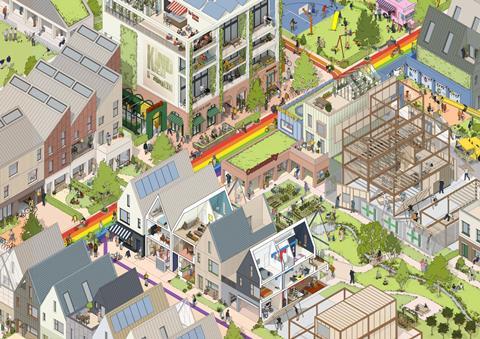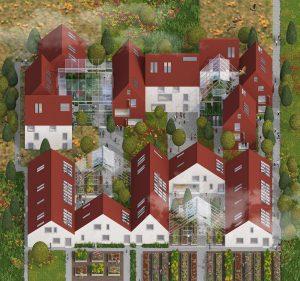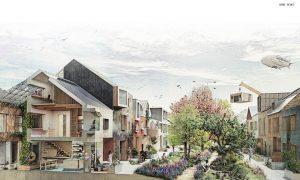Government-backed Homes of 2030 competition shortlists six for award
A firm pledging to abolish “greed-driven identikit development” is head of one of six teams shortlisted for the government-backed Home of 2030 design competition.
The competition, being run by the Riba and the BRE on behalf of the government, was set up in March to prompt innovative home designs that better tackle climate change through widely applicable commercial solutions.
Chris Brown, chair of Igloo Regeneration, said that his firm’s submission (pictured, below), which aims to allow self-builders to sustainably design and create their own homes from flexible, affordable frames and components that are simple to assemble, was designed to “give people their towns and cities back.”

Brown said: “We’re on a crusade to abolish greed-driven identikit development on soulless estates.
“Igloo champions citizens and communities against the corporate stranglehold over placemaking in the UK. After Covid-19, people will want their towns and cities back, to make beautiful places where home schooling and working from home is designed in – not an afterthought - and where the climate, nature and community are prioritised over profit.”
Igloo, behind schemes such as the Round Foundry in Leeds and Bermondsey Square in South east London, is working with architect Mawson Kerr, engineer Expedition, and sustainability consultant Useful Simple Trust on the entry.

The scheme is just one of six, many of which propose designs featuring communal outdoor spaces as well as or instead of private gardens, and including one, by Outpost Architects (pictured left), that proposes a home constructed 98% from organic material such as timber and straw.
The other finalists are:
- changebuilding with Perpendicular Architecture, Humblebee, ECOSystems Technologies and Arup
- HLM Architects with the Advanced Manufacturing Research Centre and Green Build (pictured below, right)
- Openstudio Architects Ltd
- Outpost Architects and team
- Studio OPEN
Housing minister Christopher Pincher said all the finalists had already made an exciting contribution to the designs we will need in the UK. He said: “This competition demonstrates the best of British design being brought to bear on a key issue for today, and future generations: delivering homes that are good for the planet and that promote healthy, independent living for older generations.”
“The winner of this competition will set the standard for the homes of the future”.

The competition called on entrants to devise designs for age-friendly and low environmental impact housing that promoted healthy living and was deliverable and scalable.
Alan Jones, president of the Riba, said the finalists had the potential to create affordable, age-friendly and sustainable housing. He said: “Through the clever configuration of private and public space, natural light and ventilation, intelligent use of materials and technologies – these cost-effective, low carbon homes show what’s possible when architects collaborate.”










No comments yet